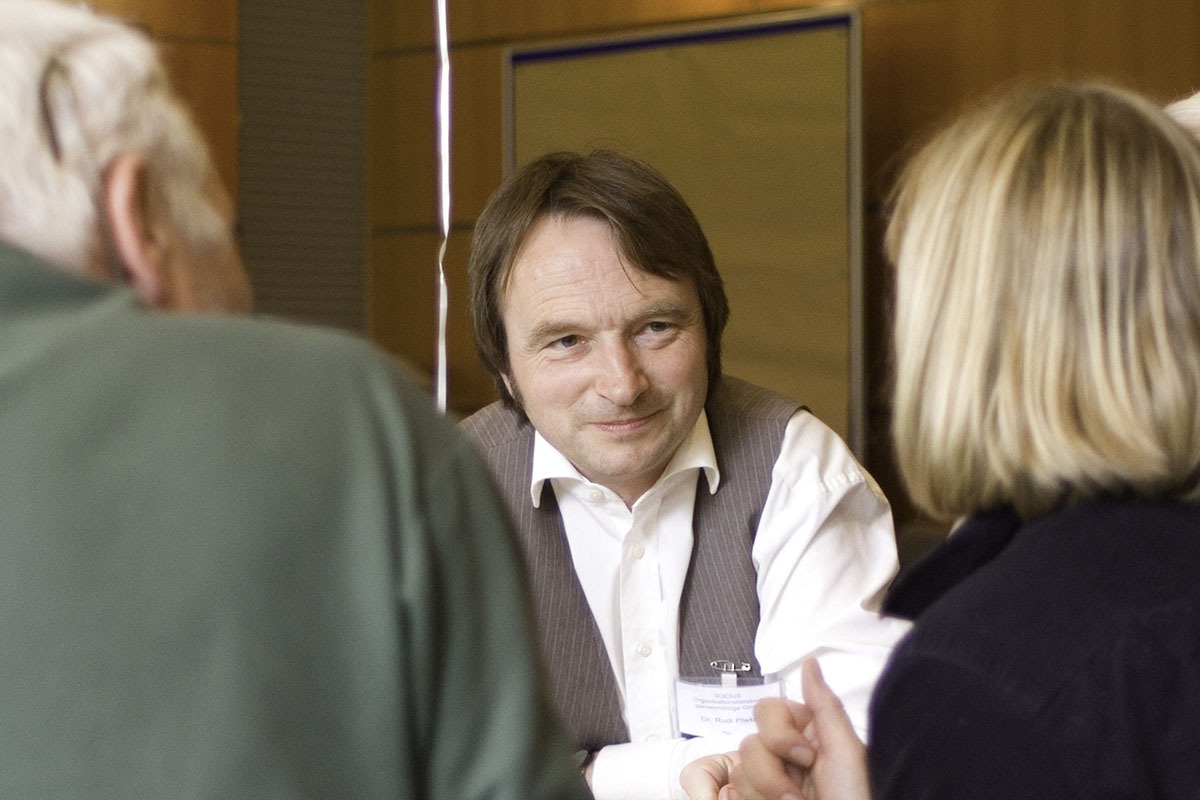How it all began
It all began with the realisation that non-profit organisations require their own specific type of „management consultancy“. With this idea in mind, Rudi Piwko In 1998, with the support of legendary inventor Prof. Artur Fischer, SOCIUS was established as a non-profit limited liability company. In the early days, the focus was on specific needs such as fundraising and public relations. With the help of the Theodor Heuss Foundation (Hildegard Hamm-Brücher), the Robert Bosch Foundation and the Mitarbeit Foundation, the first consulting projects were carried out nationally and in Eastern Europe in the early years.
Together with Christian Baier and Andreas Knoth (joined in 2002) and Nicola Kriesel and Kerstin Engelhardt (launched in 2005), the range of services was expanded to include more process-oriented topics such as team development and mediation. In 2009, the expanded structure was also given a new legal basis when all consultants became shareholders in the non-profit limited liability company.
As things started to get more stable, we thought about setting up more non-profit SOCIUS companies in Hamburg, Cologne, and Munich under the umbrella of the socius cooperative, which was founded in 2010. However, we had overestimated our capabilities with this ambitious plan and, after three years, we had to conclude that the key ingredient of our collaboration, personal collegial contact, cannot be scaled arbitrarily. We remain connected to our former colleagues in a spirit of partnership, but are now focusing on sustainable organic growth within the Berlin team. Since 2005, interns and trainees have repeatedly found a professional home and learning environment here for the foreseeable future.
With Ralph Piotrowski, Josephine Ulrich and Joana Ebbinghaus Since 2010, additional colleagues with relevant skills and perspectives have joined the team in subsequent years. At the same time, under the banner of „generational change,“ the management of the company was handed over from founder Rudi Piwko to Andreas Knoth and Christian Baier. This development, like most of the processes we accompany, is a mixture of respect for history and a focus on the ability to act within new structures. As a political model of equal co-determination, the SOCIUS cooperative forms the defining compass and framework for the internal structure of our cooperation. It provides space for further development from the pioneering phase to a model in which all participants jointly assume responsibility and creative roles.
In slow „biological“ cycles, SOCIUS has developed into a healthy organisation that is consistent with our values, without losing any of its dynamism and agility. The mix of public tenders, independent development processes, and our own and outsourced events and training courses ensures that our activities are balanced in terms of both content and finances. Since mid-2014, we have taken on Denise Nörenberg our accounting and seminar administration.
In 2017, Simon Mohn joined the team as a permanent member, representing the next generation, followed by Julia Hoffmann, which became part of SOCIUS in 2020. The coronavirus pandemic highlighted the need for supportive networks, so in the same year we strengthened our ties with our network of advisors and are delighted to have a community that has grown stronger ever since – the Nextwerk.
This growth is also reflected in our relocations. Every eight years, we moved to new premises: from the shop office in Charlottenburg, which measured 70 square metres, from 1998 to 2006, to the 140-square-metre office floor opposite until 2014. Today, we occupy 220 square metres in a central location on the Landwehr Canal in Kreuzberg, with seminar rooms and a lounge with a wood-burning stove, creating a productive atmosphere for professional exchange and social interaction.
We continue to have an appetite for development and want to grow moderately by adding one or two more colleagues and exploring new fields and forms of work. You can find out more about our own learning experiences and insights in the context of organisational development in our SOCIUS brief.
As of 2020



